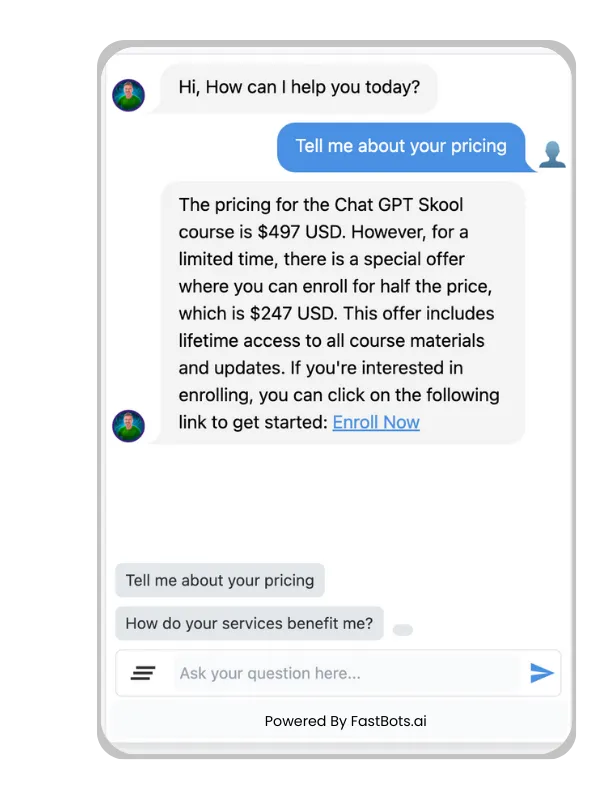In the rapidly evolving field of healthcare, chatbots are revolutionising patient care and administrative efficiency. These intelligent virtual assistants leverage advanced natural language processing (NLP) and artificial intelligence (AI) to provide immediate support for medical inquiries, appointment scheduling, and personalised health advice. By automating routine tasks, chatbots reduce the burden on healthcare professionals, allowing them to focus on more complex patient needs.
Utilising chatbots in healthcare not only benefits clinicians but also enhances patient engagement and satisfaction. They offer 24/7 accessibility, ensuring that patients receive timely responses to their questions and concerns. From emotional wellness support to handling insurance inquiries and medication reminders, chatbots are versatile tools that can address a wide array of healthcare needs efficiently.
Additionally, integrating these chatbots with electronic health records (EHR) ensures that patient interactions are informed by a comprehensive and up-to-date medical history. This integration allows for more accurate and personalised responses, leading to better health outcomes and a more seamless healthcare experience for patients.
BUILD YOUR OWN HEALTHCARE AI CHATBOT
In less than 5 minutes, you could have an AI chatbot fully trained on your business data assisting your Website visitors.
The Evolution of Chatbots in Healthcare
Chatbots in healthcare have rapidly advanced in recent years. Initially, these tools focused on providing basic information and answering frequently-asked questions. As artificial intelligence (AI) technologies developed, chatbots evolved to handle more complex tasks.
Early healthcare chatbots were mostly rule-based. They relied on pre-defined scripts and keyword recognition. This limited their ability to understand nuanced medical questions. With the integration of machine learning, these bots became smarter and more adaptable.
Modern healthcare chatbots utilise natural language processing (NLP) to provide more accurate responses. They can now understand context and intent, making interactions smoother. Moreover, developers incorporate extensive medical databases to ensure that the information provided is reliable and up-to-date.
These advancements mean chatbots can assist in various areas:
- Symptom checking
- Appointment scheduling
- Medication reminders
- Providing mental health support
Building a sophisticated healthcare chatbot is not cheap. Costs range from $15,000 to over $100,000. Monthly operational fees might be between $149 and $400, depending on the features and complexity.
Collaboration between developers, healthcare providers, and policymakers has been crucial. This ensures chatbots are designed inclusively, catering to diverse patient needs. Methods to evaluate efficacy and ensure patient data privacy are continuously being refined.
As technology progresses, chatbots are expected to play an even more integral role. Future innovations might include voice-activated solutions, multilingual support, and integration with wearable health devices.
Key Components of Healthcare Chatbots
Healthcare chatbots rely on several critical technologies. These include natural language processing, machine learning, compliance and security features, and user experience design, each playing a distinct and significant role in delivering effective services.
Natural language processing
Natural language processing (NLP) is essential for understanding and generating human-like text. NLP allows chatbots to interpret user input accurately, identifying relevant medical terms and symptoms. It enables the chatbot to engage in meaningful conversations by grasping context and subtleties in language. NLP's semantic analysis helps in providing precise responses, making the interaction feel more natural. Moreover, advancements in NLP technology assist in the better translation of complex medical jargon into understandable language for the user.
Machine Learning
Machine learning (ML) empowers chatbots to improve their performance over time. Through ML algorithms, these chatbots analyse large datasets to identify patterns in patient queries and responses. This continuous learning process enables the bot to offer increasingly accurate and personalised advice. ML helps in predicting user intent and automating responses for common questions. Additionally, integrating ML with healthcare data ensures the chatbot stays up-to-date with the latest medical research and guidelines, enhancing reliability and relevance.
Compliance and security
Compliance and security are paramount in healthcare chatbots. Adhering to regulations like GDPR, CCPA, and HIPAA ensures that patient data is handled safely and responsibly. Chatbots must implement strong encryption protocols and secure data storage to protect sensitive information from breaches. Regular audits and updates to security measures are necessary to maintain trust. By ensuring all communications and data handling processes are compliant, chatbots safeguard patient privacy, making them reliable tools for sensitive health-related interactions.
User Experience Design
User experience design focuses on making interactions intuitive and satisfying for users. A well-designed conversational flow is crucial, enabling users to navigate the chatbot easily and find the information they need without frustration. Design elements should include clear language, quick response times, and accessibility features. User feedback mechanisms help refine the design continuously. By prioritising ease of use and engagement, chatbots can improve user satisfaction and adoption rates, making them effective tools in healthcare settings.
Implementation Strategies
Effectively implementing healthcare chatbots requires strategic integration with healthcare systems, efficient patient data handling, and robust feedback loops. Prioritising these areas can enhance the functionality and reliability of chatbots in medical settings.
Integration with Healthcare Systems
Integrating chatbots with existing healthcare systems is essential for a seamless user experience. This includes connecting with Electronic Health Records (EHR).
By accessing the EHR, chatbots can provide personalised and accurate medical advice. Integration helps in scheduling appointments, managing prescription refills, and offering preventive care reminders.
Additionally, chatbots can facilitate communication between patients and healthcare providers, streamlining the care process and reducing administrative burdens.
Patient data handling
Handling patient data securely is paramount in the healthcare industry. Chatbots must comply with regulatory standards like HIPAA to ensure privacy and security.
Data encryption and secure storage methods are critical for protecting sensitive information. Implementing authentication protocols can safeguard against unauthorised access.
Furthermore, anonymizing patient data for analysis can help improve chatbot responses without compromising privacy. Ensuring transparency about data usage can build trust with users.
Feedback Loops
Establishing effective feedback loops is key to continuously improving chatbot performance. Regularly collecting user feedback helps identify areas for improvement.
Incorporating machine learning algorithms allows chatbots to learn from interactions and enhance their responses over time.
Engaging with patients to solicit feedback on usability and satisfaction can guide adjustments and upgrades. Monitoring chatbot interactions can also provide insights into user needs and system efficiencies, ensuring ongoing refinement.
Benefits and Impact on Healthcare
Chatbots are transforming healthcare by improving access to care, enhancing patient engagement, and increasing operational efficiency. These advances are driven by the integration of AI technology in the healthcare ecosystem.
Access to Care
Healthcare chatbots provide 24/7 access to medical information and assistance. Users can get instant responses to their health-related inquiries, which reduces the need to wait for healthcare providers. This is crucial during non-business hours and in remote areas where medical resources are scarce.
By triaging symptoms, chatbots can guide patients to the appropriate level of care, whether it be self-care, urgent care, or emergency services. This immediate access helps with early detection and prompt intervention, potentially improving patient outcomes.
Patient Engagement
Chatbots can significantly enhance patient engagement by providing personalised interactions. They can remind patients to take medications, follow up on treatments, and even offer tips for managing chronic conditions. This constant interaction ensures patients stay informed and motivated regarding their health management.
The anonymity provided by chatbots often encourages users to discuss sensitive health issues more openly. As a result, patients might be more likely to seek the help they need without fear or embarrassment, leading to more honest and beneficial exchanges.
Operational Efficiency
Incorporating chatbots into healthcare can streamline administrative tasks such as appointment scheduling, patient registration, and billing inquiries. Automating these processes not only frees up valuable time for healthcare staff but also reduces the likelihood of human error.
Moreover, chatbots can handle a high volume of inquiries simultaneously, ensuring quicker resolution of patient issues. This efficiency reduces waiting times and enhances the overall patient experience. By optimising these operational aspects, healthcare facilities can allocate more resources to direct patient care.

Challenges and Considerations
Integrating chatbots into healthcare brings a collection of challenges and essential considerations. The main issues revolve around privacy, the accuracy of the information provided, and healthcare providers' acceptance.
Privacy and ethical concerns
Privacy is a paramount issue when implementing chatbots in healthcare. You must ensure that all patient data is protected as per regulations like HIPAA. Confidentiality must be maintained, which involves securing data from unauthorised access and breaches.
Ethical concerns also arise, particularly regarding informed consent and the fairness of chatbot interactions. Patients should be made aware of how their data is used and stored. It’s crucial to address potential biases in the chatbot’s responses to prevent unfair treatment.
Accuracy of Information
Information accuracy is critical for chatbots in healthcare. Inaccurate information can lead to misdiagnosis or incorrect treatment recommendations. Chatbots must be rigorously tested and continuously updated with the latest medical knowledge to ensure reliability.
Medical professionals should be involved in the chatbot development process to oversee the quality of the content. Implementing a system of checks and balances, such as peer reviews, can also enhance the trustworthiness of the provided health information.
Acceptance among healthcare providers
Acceptance by healthcare providers is another significant consideration. Resistance might occur due to concerns about the chatbot’s reliability or apprehensions over technology replacing human jobs. Educating staff about chatbots' potential to reduce burnout by managing repetitive tasks can alleviate these concerns.
Healthcare providers should be involved from the outset to ensure the chatbot complements their workflow. Continuous training and feedback loops can help integrate chatbots smoothly into the healthcare system, ensuring that providers feel confident in utilising these tools.
Using chatbots in healthcare presents unique challenges, from maintaining privacy and ethical standards to ensuring the accuracy of information and gaining acceptance among providers. Addressing these considerations meticulously is essential for the successful integration of chatbots into healthcare systems.
Frequently Asked Questions
This section covers essential aspects of healthcare chatbots, including their uses, compliance with regulations, types, popular services, benefits, and considerations for implementation.
What are the common uses of chatbots in the healthcare industry?
How do healthcare chatbots comply with HIPAA regulations?
What are the top healthcare chatbot services available today?
What are the different types of chatbots used in medicine?
How do AI chatbots benefit patients and healthcare providers?
What factors should be considered when implementing a chatbot in a healthcare setting?
BUILD YOUR OWN HEALTHCARE AI CHATBOT
In less than 5 minutes, you could have an AI chatbot fully trained on your business data assisting your Website visitors.


